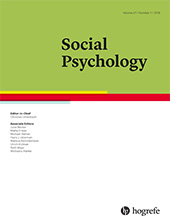Research article: 'Linking employees' extra-role efforts to consumer satisfaction: presence versus absence of complaints
 Author: Martínez, V., Y. Estreder, C. Moliner, E. García, J. Ramos y J.M. Peiró
Author: Martínez, V., Y. Estreder, C. Moliner, E. García, J. Ramos y J.M. Peiró
Title: 'Linking employees' extra-role efforts to consumer satisfaction: presence versus absence of complaints
Source: Social Psychology
Abstract: Our main goal was to test the moderating role of customer complaints (“presence” vs. “absence”) in the links from extra-role customer service (ERCS) to customer satisfaction. To this end, we conducted two independent survey studies in two service settings: hotels and service-centers for individuals with intellectual disability. A total of 571 hotel customers and 876 legal guardians of individuals with intellectual disability participated in the studies. We found that the magnitude of the relationship between ERCS and customer satisfaction was higher for presence of complaints than for absence in both service settings. Results are discussed in terms of compensation-seeking, reciprocity, generous behavior, and characteristics of service encounters between employees and customers.
View article
Recommended citation:
Martínez, V., Y. Estreder, C. Moliner, E. García, J. Ramos and J.M. Peiró: (2017): "'Linking employees' extra-role efforts to consumer satisfaction: presence versus absence ofcomplaints", Social Psychology, 48 (2), marzo, pp. 104-112






